#hey this could be a nytimes think piece
Text
i have a subscription to the nytimes and every time i see a think piece i just steel myself to read the most egregious piece of dead serious unironic so-dumb-it-loops-all-the-way-back-around-and-is-still-dumb white liberal opinion that just makes you feel guilty for no reason and ends in a call to action that brings to mind a ninth grade debate team
#im literally only renewing it for the games atp#not to insult ninth grade debate teams ofc i was personally on one myself#but the writing style is always so adhering to the book that you have to beg for any change of pace#the conclusions are always 🤮🤮🤮#hey this could be a nytimes think piece#🐋.txt
0 notes
Link
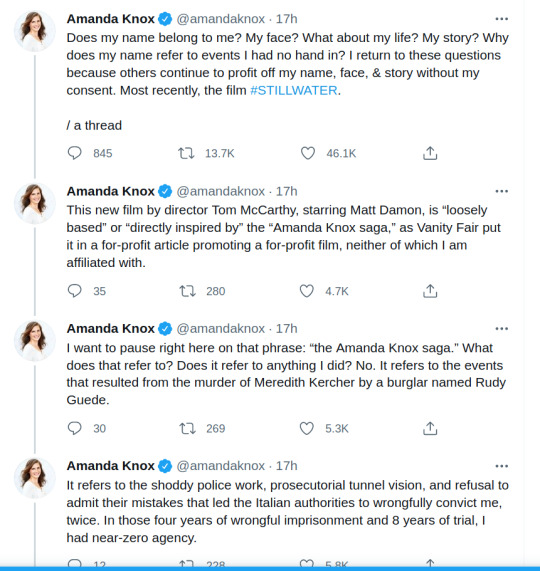

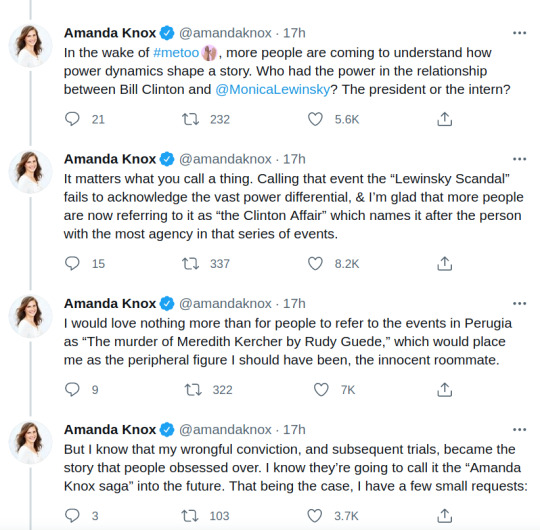

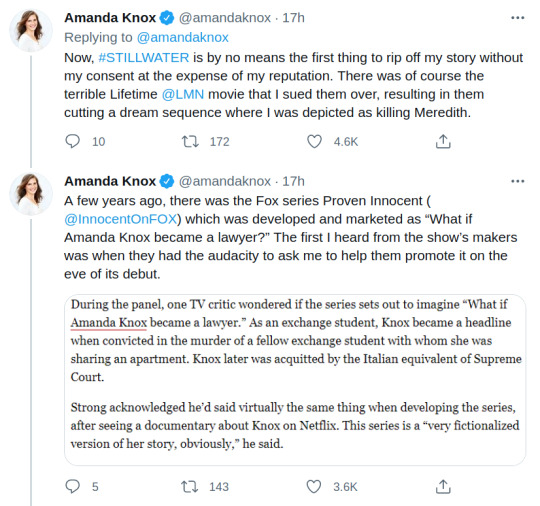
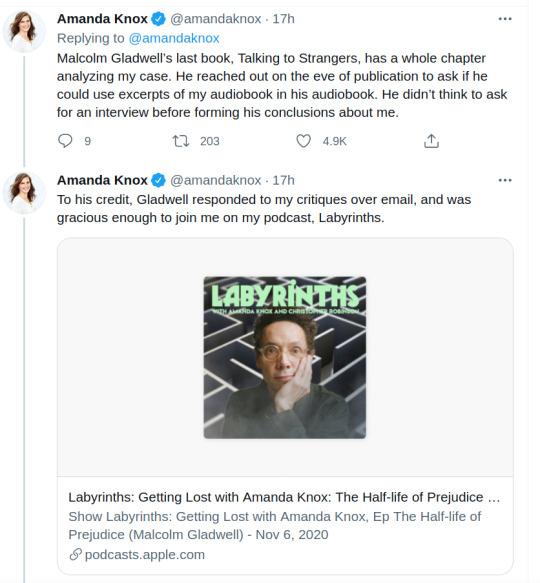



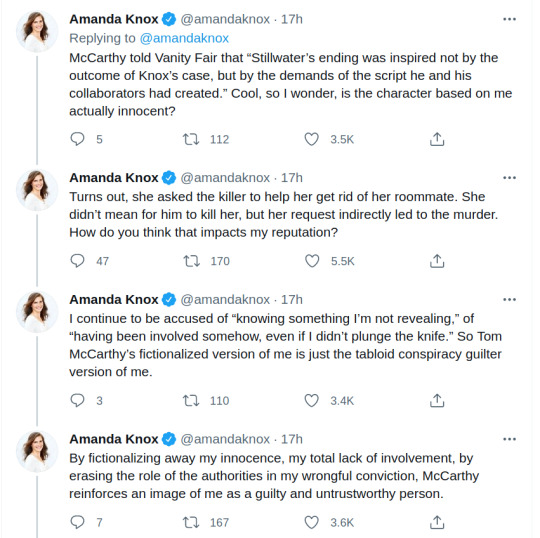
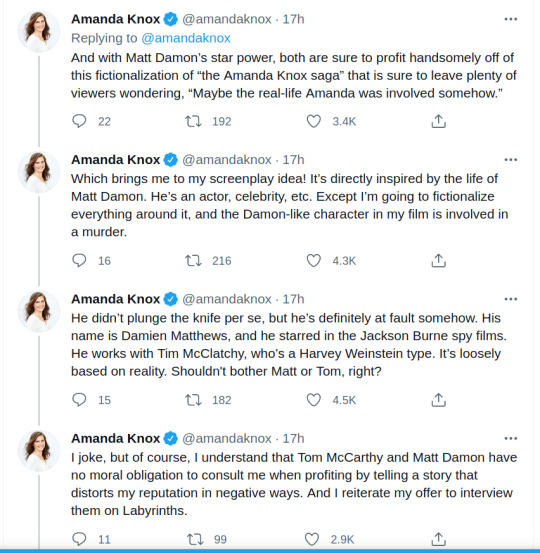
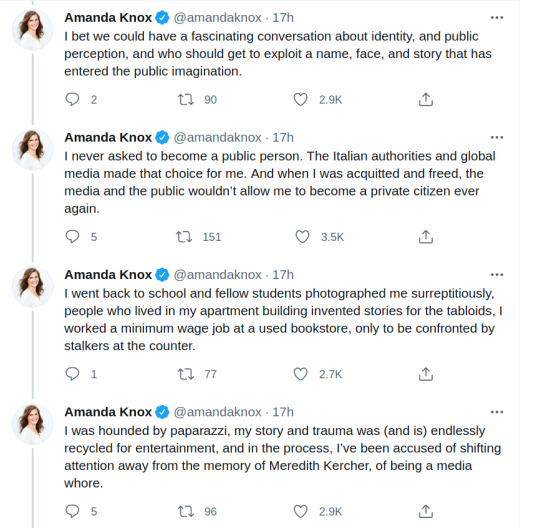
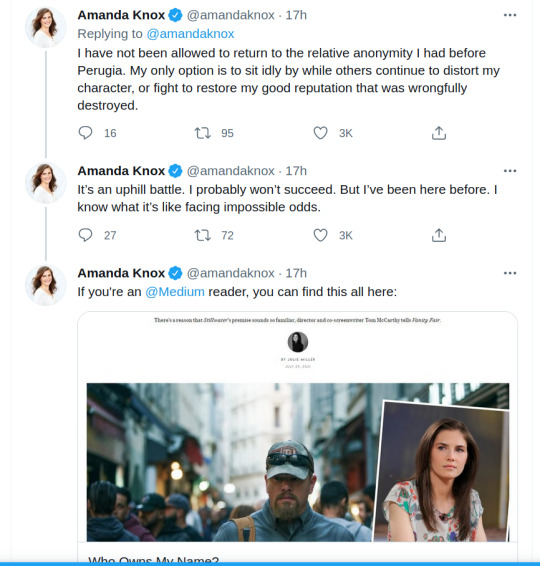
LINK TO TOP TWEET OF THREAD HERE
LINK TO THE EPISODE OF HER PODCAST WITH GLADWELL HERE
Transcription below the cut.
[44-Tweet thread by @amandaknox
Does my name belong to me? My face? What about my life? My story? Why does my name refer to events I had no hand in? I return to these questions because others continue to profit off my name, face, & story without my consent. Most recently, the film #STILLWATER
/ a thread
This new film by director Tom McCarthy, starring Matt Damon, is “loosely based” or “directly inspired by” the “Amanda Knox saga,” as Vanity Fair put in a for-profit article promoting a for-profit film, neither of which I am affiliated with.
I want to pause right here on that phrase: “the Amanda Knox saga.” What does that refer to? Does it refer to anything I did? No. It refers to the events that resulted from the murder of Meredith Kercher by a burglar named Rudy Guede.
It refers to the shoddy police work, prosecutorial tunnel vision, and refusal to admit their mistakes that led the Italian authorities to wrongfully convict me, twice. In those four years of wrongful imprisonment and 8 years of trial, I had near-zero agency.
Everyone else in that “saga” had more influence over events than I did. The erroneous focus on me by the authorities led to an erroneous focus on me by the press, which shaped how I was viewed. In prison, I had no control over my public image, no voice in my story.
This focus on me led many to complain that Meredith had been forgotten. But of course, who did they blame for that? Not the Italian authorities. Not the press. Me! Somehow it was my fault that the police and media focused on me at Meredith’s expense.
The result of this is that 15 years later, my name is the name associated with this tragic series of events, of which I had zero impact on. Meredith’s name is often left out, as is Rudy Guede’s. When he was released from prison recently, this was the NY Post headline. [Picture of headline reading “Man who killed Amanda Knox’s roommate freed on community service By Lee Brown December 6, 2020]
In the wake of #metoo, more people are coming to understand how power dynamics shape a story. Who had the power in the relationship between Bill Clinton and @MonicaLewinsky? The president or the intern?
I would love nothing more than for people to refer to the events in Perugia as “The murder of Meredith Kercher by Rudy Guede,” which would place me as the peripheral figure I should have been, the innocent roommate.
But I know that my wrongful conviction, and subsequent trials, became the story that people obsessed over. I know they’re going to call it the “Amanda Knox saga” into the future. That being the case, I have a few small requests.
Don’t blame me for the fact that others put the focus on me instead of Meredith. And when you refer to these events, understand that how you talk about it affects the people involved: Meredith’s family, my family, @Raffasolaries, and me.
Don’t do what @deadlinepete did when reviewing #STILLWATER for @deadline, referring to me as a convicted murderer while conveniently leaving out my acquittal. I asked him to correct it. No response. [Picture of text from his article reading “The 2007 case of Amanda Knox, the American convicted in an Italian court of murdering her roommate, was the impetus for writer-director Tom McCarthy’s Stillwater, but in the 10 years since beginning, abandoning and starting over, it has evolved into something much more - and much better.”]
And if you must refer to the “Amanda Knox saga” maybe don’t call it, as the @nytimes did in profiling Matt Damon, “the sordid Amanda Knox saga.” Sordid: morally vile. Not a great adjective to have placed next to your name. Repeat something often enough, and people believe it.
Now, #STILLWATER is by no means the first thing to rip off my story without my consent at the expense of my reputation. There was of course the terrible Lifetime @LMN movie that I sued them over, resulting in them cutting a dream sequence where I was depicted as killing Meredith.
A few years ago, there was the Fox series Proven Innocent (@InnocentOnFOX) which was developed and marketed as “What if Amanda Knox became a lawyer?” The first I heard from the show’s makers was when they had the audacity to ask me to help them promote it on the eve of its debut. [Picture of text reading “During the panel, one TV critic wondered if the series sets out to imagine “What if Amanda Knox became a lawyer.” as an exchange student, Knox became a headline when convicted in the murder of a fellow exchange student with whom she was sharing an apartment. Knox later was acquitted by the Italian equivalent of the Supreme Court. Strong acknowledged he’d said virtually the same thing when developing the series, after seeing a documentary about Knox on Netflix. This series is a “very fictionalized version of her story, obviously,” he said.”]
Malcolm Gladwell’s last book, Talking to Strangers, has a whole chapter analyzing my case. He reached out on the eve of publication to ask if he could use excerpts from my audiobook in his audiobook. He didn’t think to ask for an interview before forming his conclusions about me.
To his credit, Gladwell responded to my critiques over email, and was gracious enough to join me on my podcast, Labyrinths. [Link to the episode of her podcast with Gladwell]
I extend the same invitation to Tom McCarthy and Matt Damon, who I hope hear what I’m about to say about #STILLWATER
#STILLWATER was “directly inspired by the Amanda Knox saga.” Director Tom McCarthy tells Vanity Fair, “he couldn’t help but imagine how it would feel to be in Knox’s shoes.” ...But that didn’t inspire him to ask me how it felt to be in my shoes.
He became interested in the family dynamics of the “Amanda Knox saga.” “Who are the people that are visiting [her], and what are those relationships? Like, what’s the story around the story?” I have a lot to say about that, & would have told McCarthy... if he’d ever reached out.
“We decided, ‘Hey, let’s leave the Amanda Knox case behind,’“ McCarthy tells Vanity Fair. “But let me take this piece of the story - an American woman studying abroad involved in some kind of sensational crime and she ends up in jail - and fictionalize everything around it.”
Let me stop you right there. That story, my story, is not about an American woman studying abroad “involved in some kind of sensational crime.” It’s about an American woman NOT involved in a sensational crime, and yet wrongfully convicted.
And if you’re going to “leave the Amanda Knox case behind,” and “fictionalize everything around it,” maybe don’t use my name to promote it. You’re not leaving the Amanda Knox case behind very well if every single review mentions me.
You’re not leaving the Amanda Knox case behind when my face appears on profiles and articles about the film. [Picture of Vanity Fair headline “Stillwater: How much of Matt Damon’s New Movie Was Inspired by Amanda Knox? By Julie Miller” with a picture from the movie below and a picture of Amanda Knox superimposed over it.]
But, all this I mostly forgive. I get it. There’s money to be made, and you have no obligation to approach me. What I’m more bothered by is how this film, “directly inspired by the Amanda Knox saga, “fictionalizes” me and this story.
I was accused of being involved in a death orgy, a sex-game gone wrong, when I was nothing but platonic friends with Meredith. But the fictionalized me in #STILLWATER does have a sexual relationship with her murdered roommate.
In the film, the character based on me gives a tip to her father to help find the man who really killed her friend. Matt Damon tracks him down. This fictionalizing erases the corruption and ineptitude of the authorities.
What’s crazier is that, in reality, the authorities already had the killer in custody. He was convicted before my trial even began. They didn’t need to find him. And even so, they pressed on in persecuting me, because they didn’t want to admit they had been wrong.
McCarthy told Vanity Fair that “Stillwater’s ending was inspired not by the outcome of Knox’s case, but by the demands of the script he and his collaborators had created.” Cool, so I wonder, is the character based on me actually innocent?
Turns out, she asked the killer to help her get rid of her roommate. She didn’t mean for him to kill her, but her request indirectly led to the murder. How do you think that impacts my reputation?
I continue to be accused of “knowing something I’m not revealing,” of “having been involved somehow, even if I didn’t plunge the knife.” So Tom McCarthy’s fictionalized version of me is just the tabloid conspiracy guilter version of me.
By fictionalizing away my innocence, my total lack of involvement, by erasing the role of the authorities in my wrongful conviction, McCarthy reinforces an image of me as a guilty and untrustworthy person.
And with Matt Damon’s star power, both are sure to profit handsomely off of this fictionalization of “the Amanda Knox saga” that is sure to leave plenty of viewers wondering, “Maybe the real-life Amanda was involved somehow.”
Which brings me to my screenplay idea! It’s directly inspired by the life of Matt Damon. He’s an actor, celebrity, etc. Except I’m going to fictionalize everything around it, and the Damon-like character in my film is involved in a murder.
He didn’t plunge the knife per se, but he’s definitely at fault somehow. His name is Damien Matthews, and he starred in the Jackson Burne spy films. He works with Tim McClatchy, who’s a Harvey Weinstein type. It’s loosely based on reality. Shouldn’t bother Matt or Tom, right?
I joke, but of course, I understand that Tom McCarthy and Matt Damon have no moral obligation to consult me when profiting by telling a story that distorts my reputation in negative ways. And I reiterate my offer to interview them on Labyrinths.
I bet we could have a fascinating conversation about identity, and public perception, and who should get to exploit a name, face, and story that has entered the public imagination.
I never asked to become a public person. The Italian authorities and global media made that choice for me. And when I was acquitted and freed, the media and the public wouldn’t allow me to become a private citizen ever again.
I went back to school and fellow students photographed me surreptitiously, people who lived in my apartment building invented stories for the tabloids, I worked a minimum wage job at a used bookstore, only to be confronted by stalkers at the counter.
I was hounded by paparazzi, my story and trauma was (and is) endlessly recycled for entertainment, and in the process, I’ve been accused of shifting attention away from the memory of Meredith Kercher, of being a media whore.
I have not been allowed to return to the relative anonymity I had before Perugia. My only option is to sit idly by while others continue to distort my character, or fight to restore my good reputation that was wrongfully destroyed.
It’s an uphill battle. I probably won’t succeed. But I’ve been here before. I know what it’s like facing impossible odds.
If you’re on @Medium reader, you can find this all here: [link to article shared above]
9 notes
·
View notes
Text
A note on fictional jobs
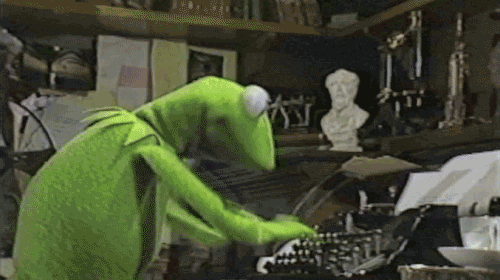
There's a joke that all fanfic characters are either baristas, teachers, lawyers or some denizen of the tattoo/florist au set. This isn't really fully true (there's also witches and vampire hunters!) but for anyone going for a realistic setting, let me at least, as someone who has worked a number of jobs in media, software development and catering, give some pointers on how that stuff works, because dear lord does Hollywood get it wrong.
This post is 2k words, so under the cut it goes.

Journalism/Photography/Media
General tips
This sector seems to be pretty popular in old school comics, and for good reason. Clark Kent gets to go out into the city and be near events. It's a job women are historically allowed to do (and be sassy in) and even Peter Parker gets to just traipse around the city getting into adventures.
It must also be noted that all these characters were developed in the first half of the 20th century, and media has changed a lot since then.
If your character is a journalist, they will work long hours and not be paid *that* much. Carrie Bradshaw is the most unrealistic journalist character in the history of everything. Especially after, oh, 2010 or so, when the traditional press sales really started declining. No journalist is that well paid for that little. And none will have that much free time.
Journalists generally have a beat, and what they do and know heavily depends on that. Your character can get into the gritty streets of downtown chasing drug dealers, or they can go to theatre premieres. They won't do both. The Vast Majority of modern media have beats. A person can be a sports caster and then he will go to sports events to report them. They can be a jetset reporter or restaurant reviewer and go to swanky places. They can be a cultural reporter and be invited to premieres and shows. They can be a dedicated business journalist, reporting on IT, or cardboard logistics, or whatever, and go to conferences around the world. But they will rarely be all these things at once.
How wide this beat is, depends heavily on the 'range' of the medium. Big news rooms, like NYTimes, have a lot of journalists, and some very, Very specialised ones. This is deep dive, spend weeks trailing every leak out of the White House stuff. In contrast, a small regional tv station can have their reporter (with or without a camera man and sound tech) drive around the countryside reporting on pumpkin carving festivals one day, and grisly murder the next.
A lot also depends on the medium. If the character works for a newspaper, they will have a noon to eight shift as a writer, and a two to ten shift, most likely, as an editor, because papers need to get printed overnight. If it's a weekly or a monthly print mag, there will be a few days with relative freedom to do interviews and such, and then a few days of crunch time. If they work for a news website they will have a desk job and most likely work in shifts. TV and radio news people are the ones doing most of the running around to get quotes, but they are also on the tightest of schedules.
Speaking of schedules. Unless the character is a blogger, they won't finish an article and immediately rush it to the printer/publish it. Reputable news sources have, at the very least, a copy editor to check for mistakes and typos. Bigger newspapers and magazines and sites have a dedicated fact checker.
Very VERY few papers in the world have full time photographers on the payroll. If your character is a photographer, they will most likely be a freelancer and do corporate events or weddings on the side (sorry Peter Parker). What happens is, a medium will decide in advance which article or interview will require a picture, and book a photographer for that piece.
Any other pictures tend to come from news agencies. Think Reuters or Associated Press. These sort of agencies do use full time photographers, as well as freelancers who happen to visit an event. They'll take like two hundred picture and sell them to the agency, who distributes them to media all over the world.
Few media have the money for correspondents, so they'll pick only a handful. This means a foreign correspondent has a large area to cover. European news media tend to have one correspondent in the US, covering the Entire US, for instance. American media tend to have more moneys, but if your character is a respondent in, say India, expect them to trek along India a lot, because they're prob the only one in that vast country.
Having said that, coverage, especially war coverage, is super expensive. If they're sending a journo to a war zone, it will absolutely not be a rookie. They will have proven themselves capable, preferably speak the language and they'll be Very Prepared. Think local guides, vast networks of informants etc. A startling amount of war reporters and investigative journalists are also freelance. If they are trekking through a jungle and come across anything exciting, you bet they'll try to sell that story in several angles/versions to different media.
Have you considered:
Bread and Butter Freelancers: It's a gig economy my friends. Freelance writey people don't have a boss and usually work from home or from some coffee shop. If they are to be successful (enough to make a living), they'll still have a beat, and will actually have to be fairly good at this subject. Since these characters make their own shifts, they do have the ability to go out in the middle of the day to do superheroing or witchery or to investigate the disappearance of their best friend. Upsides: Freedom. Downsides: Usually very little money. Unstable hours, like one day nothing and then a week of 14 hour days. The crushing stress of looming deadlines ànd job insecurity.
Copywriters: The people that write the text on corporate websites, that fill mail order catalogues with entries for every picture, compose newsletters for various organisations, turn technical instructions into actually mildly readable user manuals. Upside: money. If they're good at it, they will have a fairly stable income. They have the same freedom as freelancers to go flirt with flower shop assistants. Downside: the crushing knowledge that with every piece you write, your soul sinks deeper into the void. Anyone who's ever read clientsfromhell will know what to expect of their clientele.
Lay-outers: The creative side of making media. The bros making the graphs, putting the text to paper, photoshoping the head of Putin onto the body of a baby, whatever. Upside: artist character. This is a slightly more realistic character than the 'painter'. They're creative, but they have yet to sell their soul to the corporate machine (depending on the medium you put them in, of course). Downside: this is basically a desk job with stable hours.
Cameraman, sound technician: the people that hang out with the news reporter and trot all over the region with him/her. Upside: see the world! Without being instantly recognizable. Downside: they're probably stuck in their mission and they rarely have the power to go 'hey, let's investigate over there'.
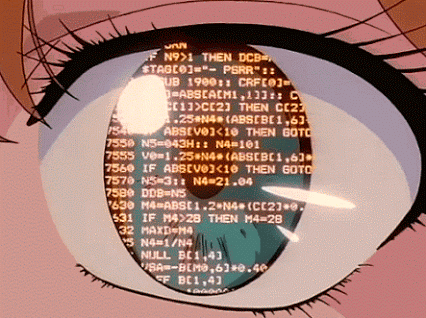
Software development
General tips
There's actually a few different environments for software engineers to work.
Start-ups: the hip one. Think Silicon Valley, the upstarts in sneakers and Star Wars t-shirts living on pizza and red bull and basically coding 20 hours a day. Depending on where they are in the growth of their start-up, these people will be nearly alone, or have a team of coworkers. Traditionally, start-ups start with like a founder (or four) and an idea, and some coding. As the company grows they'll hire a sales person to sell this stuff, a marketing manager to brand it, a support person to troubleshoot it, an HR person, etc.
A very Very VERY large part of start-up business is pitching, aka selling your premise to a bunch of venture capitalists and investors. It's Dragon's Den. Literally. Your super shy, autism spectrum character who hates public speaking and who can't even look at another person without blushing would make a super crappy start-up founder by themselves. They will definitely need their bubbly, motivational speaker best friend. On the other hand: this is an amazing environment for that suave, smooth talking character who could sell sand in the desert.
Second environment: corporate. The vast majority of software engineers out there just work for some big company. These are the people building and deploying management system software for banks, installing security in factories, that sort of thing. A lot of the time they're consultants. They wear a suit. They use something called the Waterfall method, which sucks out your soul, or the Agile method, which also sucks out your soul. There's a lot of managing and meeting and progress reports. If they're good enough, they're allowed to leave the tie at home.
Software needs to be tested. You don't just write the code last minute and put it live.
The coders are absolutely not the only people in a software development team. There's the project managers, the designers, the copywriters, the testers, the lawyers, oh god, the lawyers, etc.
Software Needs to be tested. It takes ages. I cannot stress this enough. It usually happens in India or some other Asian country where the wages are lower.
Will a lot of environments, even corporate, allow their creatives to come to work in like… jeans and a t-shirt, the only people realistically allowed to actually act like teenagers, in any environment (corporate, start-up, small business), are the ones with skills that are very hard to find. In essence: security experts and specifically white hat hackers. Yes, you're allowed to have a hacker character that acts dumb and comes to work in his pyjamas and it will be realistic that he does not get fired. Your clerk character that's super rude and deals in hurtful quips? Not so much.
SOFTWARE NEEDS TO BE TESTED
Have you considered:
Researchers: you know those people that made a song that can give Alexa commands without the owner knowing? Those are university researchers. A lot of really cool stuff is being developed not by office workers, but at universities. This includes software. Upside: probably a looser environment, with a lot of young people. Downside: you're basically writing a college AU.
Venture capitalists: in a Silicon Valley environment, this is basically the 'wealthy businessman' stereotype of old. The dragons in the dragon's den, the people that traipse around the city talking to people and assessing the potential of their pitch, before throwing money at them (or not). There's a bunch of paperwork, but they probably have a small army of accountants to handle this.
Evangelists: the cool people that hold TED talks. They usually work for a big tech company, as a specialist, and part of their job is to be a spokesperson. A good example of this is the tech researcher, who has a day job finding nasty hackers or viruses, and who also blogs about that and holds talks and presentations about securing your business. A character like this has the advantage of being a deep tech nerd hacker type. They're rarely the CEO, so they can go deep into the coding, while also travelling places and meeting crowds of press or business people.
Project managers: these don't tend to do the actual coding, but they do, well, the managing. Characters like this will be more social and creative, they're the ones making the reports and presenting their progress to the CEO, and they're the ones troubleshooting when stuff goes wrong. In general, there's a lot of planning involved.

Bakeries/Catering
General tips
Mass production of food is gruelling. You think you're writing about your sexy pastry chef and how they're carefully, tip of their tongue peeking through their lips, putting a cherry on top of that little moeilleux, but in reality, there's two hundred more to finish on this rack alone and they need to be done in under an hour.
Say it with me, people: baking is a night job. Industrial baking, mom-and-pop rural French bakery, bagel shop, donuts. Someone is going to be making all that stuff before the first customer arrives and that someone is slaving in front of a hot oven at four in the morning.
Any type of catering is a time management business. You know this. You've all watched Great British Bake-off (or, like, Chopped or whatever). If your professional cake maker is only working on one project/wedding at a time, they're not going to be in business for long. Your line chef will be plating up several dishes per minute. Your short order cook is baking six pancakes and scrambling eggs at the exact same time.
Unless it's a very large kitchen, the people that cook are the same ones that clean. And since it's food prep, there is a lot of cleaning.
Have you considered:
Recipe writer: ok so we're kinda back to media but big tv chefs don't make all those recipes themselves. Someone, usually a freelancer, writes them and tests them. Imagine someone getting the request to develop a seasonal cronut recipe that involves peaches and charcoal, because it's hip, and then baking several batches until they find something edible. This is a somewhat realistic environment for your super creative baker to live in a small house and make some money while also working on a book on the side, and falling in love with the quirky … goat… herd… brewer, florist, whatever.
115 notes
·
View notes
Text
Absolutely shocking news! Trump press secretary Sarah Huckabee Sanders reads Christian devotionals
Shocking!
Absolutely shocking!
Perhaps you saw the news today — via a tweet by the New York Times to its nearly 39 million followers — about White House Press Secretary Sarah Huckabee Sanders.
In case you're standing, I'll hold on just a second so you can sit down.
OK, brace yourself. Here it is. Deep breath, everyone!
Without further weeping and gnashing of teeth, the tweet from the Times:
President Trump's new press secretary is an evangelical who reads a Christian devotional before news briefings https://t.co/3WTTwdMMG1
— The New York Times (@nytimes) August 8, 2017
Did you catch that!?
To repeat, Sanders IS AN EVANGELICAL WHO READS A CHRISTIAN DEVOTIONAL BEFORE NEWS BRIEFINGS.
Stop the presses!
I kid. I kid. But more than a few folks on Twitter chuckled at the Times' characterization of Sanders' spiritual discipline:
New York Times shocked that Sarah Sanders reads devotions before press briefings https://t.co/TEy0K8BznU by @PhilipWegmann pic.twitter.com/UT2PETLG8x
— Washington Examiner (@dcexaminer) August 8, 2017
Readers actually have to scroll about a third a way down the story before getting to the religious part.
The lede focuses — big surprise! — on the politics:
WASHINGTON — Pickle did not go as planned.
When Sarah Huckabee Sanders, the newly minted White House press secretary, began her first official briefing by reading a child’s letter to President Trump — “Everybody calls me Pickle, I’m 9 years old, and you’re my favorite president” — the backlash was swift.
Reporters called it a transparent attempt to distract from numerous scandals roiling the White House. Theories surfaced that Mr. Trump, who once impersonated his own spokesman, had written the missive himself. (He didn’t.)
“I didn’t know it was going to be such a controversy,” Ms. Sanders said during an interview last week in her spartan West Wing office. “I was like, what has happened in America when a kid writes a very innocent, nice letter and it turns into, like, handwriting specialists and psychologists?”
Absurd as it was, the Pickle affair offered a low-stakes microcosm of the deep distrust that has developed between the Trump administration and the journalists whose work the president derides as “fake news.” And it underscored the why-would-you-want-this nature of Ms. Sanders’s new job: defending a president who is at war with the news media and an administration that has repeatedly been denounced for playing loose with facts.
Now Ms. Sanders, who inherited her position when her celebrity predecessor Sean Spicer quit, is stepping into the glare, trying to manage coverage of a tumultuous White House while mollifying a boss who believes he is his own best spokesman.
Keep reading, though, and the Times devotes an entire three paragraphs (!!!) to Sanders' faith:
An evangelical who reads from a book of Christian devotionals before every briefing — and the daughter of the pastor-turned-presidential-candidate Mike Huckabee, the former Republican governor of Arkansas — Ms. Sanders is an unlikely public face for Mr. Trump, a twice-divorced connoisseur of grievance.
“I certainly didn’t approve of a couple of the comments,” Ms. Sanders said of her time on Mr. Trump’s campaign, where she served as an adviser and on-air surrogate. “But at the same time, we were looking for a commander in chief, not a pastor.”
“Oftentimes, people want to make politicians perfect,” she added. “And that’s one of the actual beauties of Christianity, is understanding that no one is.”
Sarcasm aside, I'll go ahead and voice my unpopular opinion: I think the detail about Sanders reading a devotional before press briefings is interesting and highly appropriate for a major newspaper profile of the press secretary.
My problem with the Times piece is this: Religion makes only a cameo appearance in this story. The 140-character version of the story promoted on Twitter is about as deep as the faith angle gets. That's too bad. Once again, a Times piece could have benefited from the expertise of a religion-beat professional.
In the above video, Sanders is asked about her faith in an interview with the Christian Broadcasting Network's "Faith Nation." At about the 9:00 mark, she replies:
I think (for) anybody of authentic faith, it has to be the primary thing that drives everything that you do. Some people want to say you can separate your faith from your work. I feel very much the opposite of that. I think your faith defines who you are, and I’m certainly not going to shy away from that. It’s a big part of who I am and something I’m more than happy to talk about openly and answer any question about it. The only challenge is, sometimes, making sure it’s the right platform and the right location and environment in which to do that, an appropriate place.
Back to the Times story: The snippet that the paper provides hints at a better, deeper religion story begging to be told.
Personally, I'd love to know more about the devotionals, including the source and the specific content. I'd love to hear — in Sanders' own words — what the devotionals mean to her and how they influence her approach to her job. In general, I'd love more facts about the Sanders' faith background and beliefs.
A quick Google search finds articles that describe Sanders as "a devout Christian" and note that she graduated from Ouachita Baptist University in Arkansas, which is also her father's alma mater. Mike Huckabee was, of course, a Southern Baptist pastor before he became a politician.
In 2012, Sanders posted a photo of her baby's baptism:
Scarlett was baptized today! Big thank u to our family & her godparents @chipsaltsman & @katiebethharris. pic.twitter.com/cx0AChsV
— Sarah Huckabee (@SarahHuckabee) May 27, 2012
But wait, I don't think Southern Baptist baptize babies, do they? So what is Sanders' specific Christian affiliation?
Given that question and many others, the Sanders story story seems ready made for a little ghostbusting.
Hey Godbeat friends: Please, somebody take the little the Times reported and run with it.
Go to the article
0 notes